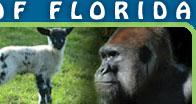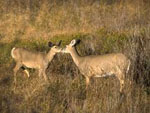



|
While ARFF opposes all forms of hunting, there is no more repugnant hunting practice than shooting tame animals in fenced enclosures for a fee in order to obtain a trophy. Most animals in canned hunts are far more tame, and less wary of humans, than their wild counterparts. Many spent part of their lives in zoos. Others are the offspring of zoo animals. In all canned hunts, the animals become acclimated to at least some degree of human interaction, and thus they lose the instinct to flee. An ARFF employee visited one canned hunt where the same vehicle that brought hunters to the killing fields was also used each morning to bring the animals food. Thus, as the hunters sit in the back of the vehicle preparing to shoot, the animals trot up, expecting food. There is no “sport” to this activity. The animals are confined, and the kills are often guaranteed. Canned hunting violates even most hunters’ concepts of “fair chase” and “sportsmanship,” and should be banned. (It must be emphasized that ARFF does not consider any hunting to be “fair” or “sport.”) Even
Many Hunters Oppose Canned Hunts Native
Wildlife Threatened WHAT
YOU CAN DO: Urge your federal senators and representatives to support the Captive Exotic Animal Protection Act, which is currently before Congress. At this time, no federal law governs canned hunting. The Animal Welfare Act does not regulate game preserves, hunting preserves, or canned hunts. Although the Endangered Species Act protects species of animals listed as endangered or threatened, it does not prohibit private ownership of endangered animals and may even allow the hunting of endangered species under certain circumstances, such as when the ranch is part of a breeding program for a particular species. Federal legislation regarding canned hunts has been introduced in Congress since 1994, but has not yet passed. The Captive Exotic Animal Protection Act would make it illegal to knowingly transfer, transport or possess in interstate or foreign commerce a confined exotic mammal “for the purpose of allowing the killing or injuring of that animal for entertainment or the collection of a trophy.” The Captive Exotic Animal Protection Act is not an ideal, “animal rights” bill. While it still allows some forms of canned hunts, ARFF strongly supports this bill, as do virtually all other animal protection organizations, because of the major progress it would accomplish towards the ultimate goal of ending all canned hunts. Ask your local zoo about its policy on surplus animals and their disposition. Ask zoo officials to make a commitment to provide any animal born in their facility with responsible, lifelong care. Too often, when babies are born at zoos, the adults must be moved away to make room. Sometimes, after passing through several hands, those animals (or their offspring) end up at canned hunts. Do not support the trade of wild animals in any form—as “pets,” products, or entertainment. Oppose the establishment of hunts or game ranches in your community. Attend and speak up at public hearings relating to the establishment of new hunting ranches. Urge your county/city’s animal control authorities to apply local anti-cruelty laws to existing hunt situations. Speak out about canned hunts. Write letters to your local newspaper about canned hunts or canned hunt legislation affecting your community. Let us know if you are aware of any canned hunts in Florida. Become a member of the Animal Rights Foundation of Florida (ARFF). If you are already a member, consider an additional donation to help us fight canned hunts in Florida. Here is a partial price list for one Florida canned hunt. This list is from the Brady Ranch in Okeechobee, and is current as of October, 2002: Trophy
Axis Deer, $1500 |

1431 N. Federal Highway | Fort Lauderdale, FL 33304 | Tel. 954-727-ARFF
 Canned
hunts are legal in Florida and most states, however they only exist
in about half the states. A handful of states, including California,
Indiana, Maryland, Nevada, New Jersey, North Carolina, Oregon, Rhode
Island, Wisconsin, and Wyoming have laws specifically prohibiting
the hunting of exotic mammals in enclosures.
Canned
hunts are legal in Florida and most states, however they only exist
in about half the states. A handful of states, including California,
Indiana, Maryland, Nevada, New Jersey, North Carolina, Oregon, Rhode
Island, Wisconsin, and Wyoming have laws specifically prohibiting
the hunting of exotic mammals in enclosures.